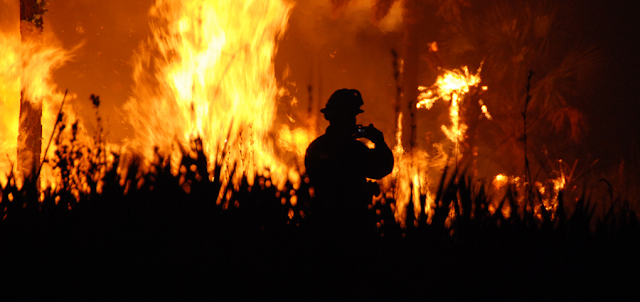Groups Ask for Comprehensive Wildfire Funding Solution
at Senate Hearing on Discussion Draft
June
23, 2016 (Arlington,
Va.) — The Senate Energy and
Natural Resources Committee is holding a hearing today to receive testimony on
a discussion draft of legislation entitled the “Wildfire Budgeting, Response
and Forest Management Act of 2016.”
In a
letter to the committee, a group of over 100 environmental, business,
industry, and recreation groups expressed concern with the eroding budgets
facing the Department of the Interior and USDA Forest Service. With such a
steep amount of the money being used for wildfire suppression, agencies are
left with significantly less for a multitude of federal, state, and private
land programs, including those that would help reduce the risk of future fires.
The
committee proposes a partial solution to fire funding that includes accessing
disaster funding and significantly reducing the practice of transferring funds
from non-suppression programs when firefighting funds run short. The groups
recommend a comprehensive fire funding solution that would: 1) access disaster
funds; 2) minimize transfers; and 3) most importantly, address
the impacts of the increasing costs on programs when budgets are developed.
“We
appreciate this committee’s recognition of the wildfire funding issue that
places an annual burden on federal agency budgets,” said Cecilia Clavet of
The Nature Conservancy, on behalf of the Fire Suppression Funding Solutions
Partner Caucus. “However, we also need to address the bigger problem of
rising firefighting costs and the resulting impacts on programs when budgeting
takes place. Too many important public land programs are shortchanged.”
Quotes
from some of the many organizations supporting a comprehensive fire funding
fix:
“American
Forests appreciates Congress’ focus on trying to solve our national wildfire
funding problem,” said Rebecca Turner, Senior Director of Programs and
Policy, American Forests. “A comprehensive approach is needed now to fund
both the programs essential to the health of our forests as well as the
ever-rising costs of fire suppression. We look forward to working with Congress
to get sensible wildfire funding passed.”
“Western mountain communities with
outdoor recreation-based economies are not only vulnerable to wildfire risk but
are forced to shoulder the financial burden when public lands funding is
shortchanged due to the increasing costs of wildfire suppression,” said
Diana Madson, Executive Director of the Mountain Pact. “We thank
the Senate Energy and Natural Resources Committee for their recognition of
the impact of wildfire funding on USDA and DOI budgets and we urge them to
address this growing problem through a comprehensive funding fix.”
“While we appreciate that language in
the Discussion Draft will eliminate the seriously illogical wildfire funding
process, it does nothing to address the equally illogical current situation
that continues to result in the erosion of funds from the very natural resource
management programs that prevent future catastrophic wildfires from destroying
resources, communities, and the lives of fire fighters,” said Hank Kashdan,
Legislative Director, National Association of Forest Service Retirees. “The
Committee has an opportunity to address both issues. The American People
deserve the Committee doing exactly that.”
“State Foresters appreciate
the draft bill language which would curtail the need for cancelling contracts
and agreements for non-fire suppression work at the end of the summer fire
season to pay for suppression costs,” said Paul DeLong, Wisconsin
State Forester and President of the National Association of State Foresters.
“However, we still must address the significant challenge of fire suppression
funding subsuming increasingly larger amounts of the agency budget, some of
which would actually fund work to reduce wildfire risk.”
“We need Congress to make fixing the
wildfire budgeting problem a priority right now to stop the profound impacts
that funding transfers have had on public land recreation, and in turn, rural
economies,” said Michael Berry, President of the National Ski Areas
Association. “It is imperative that the fix be comprehensive in nature. The
ski industry is incredibly grateful for Congress’ attention to this critical
issue.”
“Outdoor recreation drives a $646
billion economy that relies on funding and infrastructure for recreation
assets,” said Jessica Wahl, Government Affairs Manager at the Outdoor
Industry Association (OIA). “As land management agencies are dealing
with hotter and longer fire seasons, addressing a comprehensive wildfire
funding fix will help maintain dollars allotted for programs that get youth
outside, employ Americans in gateway communities and contribute to the national
economy.”
“The Rural Voices for Conservation
Coalition appreciates the committee’s pledge to address the crippling impacts
of longer fire seasons and increasing suppression costs on the Forest Service’s
budget. The escalating problem deeply impacts the agency’s ability to invest in
other, critical programs that create and maintain jobs in our rural
communities,” said Karen Hardigg, Coordinator
for Rural Voices for Conservation Coalition. “Any solution must include a
comprehensive fix in order to improve outcomes for our communities, our
landscapes and our economies.”
“As climate
change drives more frequent and intense fires across our western forests, it's
clear that a solution for wildfire borrowing is urgently needed,” said Athan
Manuel, Director of Public Lands Protection at the Sierra Club. “That fix
should be focused on addressing increasing wildfire costs.”
“SAF is encouraged that bipartisan
leaders in the House and Senate continue to explore options to fix wildfire
suppression funding,” said Clark W. Seely, CF, President of the Society of
American Foresters. “While the discussion draft makes great strides in
addressing the holistic nature of the problem, SAF is concerned that the
disaster funding language is not a comprehensive budgetary solution. Without
addressing the rapidly increasing 10-year average, less and less will continue
to be available for forest management, restoration, research, recreation, and
other critical private and public land objectives.”
###
FOR IMMEDIATE RELEASE
Contact: Heather Layman, The
Nature Conservancy, 703-841-3929 or hlayman@tnc.org
